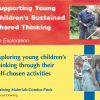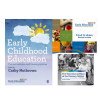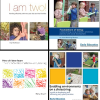Exploring the Wider World Project
The Exploring the Wider World Project was funded by the Stoke-on-Trent Opportunity Area and was delivered by Early Education between April 2019 and March 2020.
Meaningful learning opportunities relating to understanding the world rely on rich and stimulating resources.
Rich and well thought out resources make a real difference to the learning opportunities on offer to the children. They enable children to re-enact what they have experienced, to refine their thinking and test ideas they may have. An example of well thought out, imaginary world, may be a farm with animals that are male, female, and includes their offspring in a range of varieties (such as Saddle Back, Oxford Sandy and Black, and Gloucester Old Spot for pigs).
The audit will help you to think about your provision in terms of different elements from the Understanding the World strands.
Resources Audit (pdf)
Resources do not need to be complex – and there are many ways you can creatively look to extend children’s learning without having to spend excessively. By focusing on their interests, you can often create resources that they will love that are both bespoke and unique, and with which you have countless possibilities. We will continue to add possible examples of how this might be achieved during the course of the project.
Children often like identifying certain vehicles, whether by colour, shape, or make, and so car badges offer an interesting extension of this as they too come in all shapes and sizes. You could photograph a selection of different badges then you could laminate them and make a flip-book to try and find them around your locality, or you could play a matching game with two sets, or lead to a roleplay of selling the pictures or the pretend cars themselves.
The Exploring the Wider World Project was funded by the Stoke-on-Trent Opportunity Area and was delivered by Early Education between April 2019 and March 2020.
The direction of the project has been dictated by three key factors: a deep understanding of how young children learn best, developing sustainability for practice,
Rethinking our consideration of what an outing or a visit may be has been central to the project. Children need to build up their knowledge
Using the local environment enables children to develop a sense of belonging to the local community. It helps them to develop a sense of place
An early task for the Exploring the Wider World project was to identify the barriers to taking children out and about beyond the setting. Only
Risk is a natural part of our existence, as we look to explore and make sense of the world around us. What is key is
This page brings together all the key project elements of thinking through a trip or a visit in one handy place, with downloadable resources for
A reflection based upon rich and varied experiences of taking young children out into the Wider World by Kathryn Solly, Early Education Associate. Beginnings There
It is important to remember that the world of a 2-year-old is very different to ours. They are hugely fascinated by the things that we
By the time children get to be 3 years of age, they are, generally, better at walking and so can walk for longer periods of
Most 4-year-olds can walk faster and further than their younger counterparts. This means that they can venture further afield than the three year olds in
Walking is a great way to stay active for people for all ages. Particularly for children, walking: is fun and interesting – you get to
Using public transport can be really exciting for young children, especially for those who spend lots of time in cars, being ferried from place to
Social media is a powerful tool for sharing examples of good practice and celebrating achievements – but there potential pitfalls, particularly relating to consent. We
Since the introduction of the EYFS framework in 2008 there has been a huge emphasis upon encouraging parents to become engaged in their children’s learning.
This article by Early Education Associate Anni McTavish explores the term “cultural capital”, and what it might mean for early years practitioners and their settings.
Transition is part of the maturation process. Most children and their families find moving from one stage to the next seamless. Transitions need careful planning and will
We know young children appear to be starting settings with less developed language than in previous years due to a range of reasons. Understanding the






Early Education
2 Victoria Square
St Albans
AL1 3TF
T: 01727 884925
E: office@early-education.org.uk